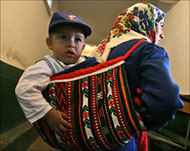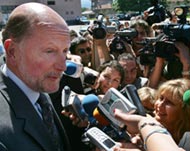Ex-communists win Bulgaria election
Bulgaria’s ex-communist Socialists have won the most votes in Saturday’s general election, according to official results released after 82.2% of votes had been counted early on Sunday morning.

The Bulgarian Socialist Party was leading with 31.6% of the popular vote, with the centre-right party of outgoing Prime Minister Simeon Saxe-Coburg garnering 20.67%, the country’s electoral commission announced as the count continued.
The Muslim-minority Movement for Rights and Freedoms came third with 10.3% of the vote, followed by a new nationalist formation, Attack, with 8.44%.
Three other parties appeared to have secured the 4% needed to take seats in parliament, at this stage of the official count.
With seven formations entering parliament, Saxe-Coburg said the division of seats in the new parliament would be “unprecedented”.
His National Movement Simeon II and the MRF are the two most likely future coalition partners for the Socialists seeking to form a goverment, political analysts said.
Alluring promises
According to Gallup researcher Andrey Raychev, the Socialists were denied a stronger showing by the emergence of a nationalist party, Attack.
BSP leader Stanishev, the 39-year-old son of a senior official in the old government, had promised a host of populist measures, including a 20% wage hike, to lure voters away from Saxe-Coburg.
 |
|
Poor Bulgarians were tempted to |
The prime minister, who was born Simeon II and crowned king of Bulgaria as a boy before the communists forced him into exile, has disappointed Bulgarians hoping he could eradicate poverty afflicting half the country.
But his successes included 6% economic growth, lower unemployment and the signing of Bulgaria’s EU accession treaty in April.
Transitional hitches
The country of eight million people missed out on the major enlargement drive of 2004 because of a mismanaged transition to democracy that still shows.
Stanishev promised that if he replaces Saxe-Coburg, he will make parliament work through the summer to clear the last obstacles to membership, but admitted he is worried about a warning from Brussels.
Both Bulgaria and fellow member-in-waiting Romania have recently been told by the European Commission to speed up reforms or wait until 2008 to join.
Political instability
Analyst Miroslava Yanova said a strong showing by small parties could force Stanishev into an unstable coalition.
Analysts said the Socialists and their preferred coalition partner, the minority Turkish party, could be denied enough seats in parliament to govern.
 |
|
Outgoing PM Saxe-Coburg |
Many voters said they were weary of the Socialists, who won elections in 1994 but plunged Bulgaria into its deepest economic crisis ever and were forced out of office within three years.
Their candidate list for the vote featured four ministers from that era.
“I have voted for the reds. I was part of a member of the communist party for 60 years. Maybe they have not completely transformed themselves but they have tried,” pensioner Dimiter Shopov said.
However publisher Petrov Andrey accused the Socialists of creating “two national catastrophes”.
“Now they are saying that they are different, but I don’t believe it,” he said after voting for Fago, a small right-leaning party.